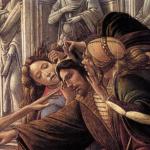
“Do not praise a man before you hear him reason, for this is the test of men” (Sir. 27:7 RSV).
St. Augustine, in his excellent work, “Of True Religion,” points out that there is a limit to human authority in relation to reason: that a soul which is purified and open to the truth, receiving it, has no human authority over it: “No human authority is set over the reason of a purified soul, for it is able to arrive at clear truth.” [1] The purified soul, therefore, transcends human authority, indeed, this is because it does not need it in order to ascertain the truth for it is directly aware of the truth. However, Augustine makes it clear, this is true only for the purified soul: for others, human authority has a role in directing them, so that their souls can become purified and be ready to receive the truth. Authority has an important role in our development, and so, within limits, it is to be trusted and believed.
In this manner, we can see in St. Augustine’s earlier writings a remarkable discussion of the relationship between authority and reason. In them, Augustine is clear: while reason has priority to authority, authority is important, especially in regards to our education. We learn through authority; a good authority will mold us and shape us so that we will eventually not have to rely upon human authority, but the authority of truth which is discerned through reason or the direct apprehension of it. Authority helps us learn from the wisdom of the past, helping us gain the rudimentary elements of reason so that we can know how to employ it in our pursuit for truth. Yet, he also suggests that reason has its limits: reason does not produce the truth, rather it opens us up so that we can come to know it. The truth is its own authority, an authority which transcends reason, because what the truth contains in itself transcends the human intellect. The truth itself must be our final authority, but discerning that truth is not easy, and we need to be trained so that we can attain it. Because of the circumstances of life, not everyone will be able to do so. Authority is the foundation by which we are trained, but then it should recede when reason, learned from that authority, can lead us to the transcendent authority of the truth. Authority, therefore, is not something which is opposed to reason, nor reason to authority: they should work together. Indeed, because we are trained in reason through the use of authority, reason itself relies upon authority, which should not be surprising, since reason cannot logically be used to prove itself (to do so would be begging the question).[2]
In his text, “On Divine Providence and the Problem of Evil,” Augustine therefore explores two ways of acquiring knowledge, through authority and reason, explaining the relationship of the two:
Likewise, with regard to the acquiring of knowledge, we are of necessity led in a twofold manner: by authority and by reason. In point of time, authority is first; in the order of reality, reason is prior. What takes precedence in operation is one thing; what is more highly prized as an object of desire is something else. Consequently, although the authority of upright men seems to be the safer guide for the uninstructed multitude, reason is better adapted for the educated. Furthermore, since no one becomes learned except by ceasing to be unlearned, and since no unlearned person knows in what quality he ought to present himself to instructors or by what manner of life he may become docile, it happens that for those who seek to learn great and hidden truths authority alone opens the door.[3]
In order of time, we learn first from authority. In order of reality, in the order of what is true, reason takes precedence. This means that if reason can truly show an objection to some authority (and not through some misunderstanding or equivocation or other similar mistakes), reason is to take precedence over what is suggested by authority. Likewise, Augustine explains, reason is for those who have been educated, but education is established through the study of texts and ideas presented by various authorities, helping us to have a basic understanding of reality from which we can then reason and come to further conclusions about the truth. Without such a foundation, reason, even when it is properly trained, becomes useless, because reason cannot discern the truth by itself: it can only explore and discern elements of the truth based upon what it has been given: if it is given nothing, there is nothing it can produce. If it is given bad data, it will infallibly arrive to a conclusion, but that conclusion, though reasonable, cannot be established as true. Thus, Augustine points out, though reason is fit for the educated, first someone must be educated and that requires accepting some authority prior to the use of reason itself.
Nonetheless, Augustine understands the problem of relying upon authority for the truth. Human authority is very fallible:
But human authority is very often deceiving. Yet it rightly seems to show itself at its best in those men who proper various proofs for their teachings, insofar as the mind of the unlearned can grasp them, and who do not live otherwise than how they prescribe that one ought to live. [4]
Augustine, while pointing out we need some authority to help us in our education, also points out that not everyone who claims to be an authority should be accepted as such. Authority can be easily abused. Those who claim to possess it can be wrong, and lead us astray. For this reason, Augustine says that the best form of authority is that which does not rely upon itself alone, but one which uses reason, discerning the truth based upon commonly accepted facts, so that the one being educated can move from a student who relies upon authority alone to one who learns the process by which authority discerns the truth and so become an authority themselves. The basis of education is to move us from the state of learning from others to being able to discern the truth for ourselves. Likewise, if an authority does not live according to what they teach, this does not mean their teaching is wrong (for that would be an ad hominem to suggest as much); nonetheless, it will at least raise doubts as to whether or not they believe what they teach or if they are making claims for the sake of control for others and the truth lies beyond what they suggest, making it reasonable for some to doubt their claims.[5]The key is to realize that the truth does not rely upon such authorities, and so if some authority speaks the truth but fails to live it out themselves, the truth remains true despite the failings of that authority.
For Augustine, then, the point is about the elevation of the soul, allowing it to be transformed so it is capable of apprehending the truth. In his, “Of True Religion,” he suggests that learning from authority and learning from reason are two different methods which we employ so that we can properly progress towards the truth. The first, authority, prepares us for the second, reason; but then, he says, reason itself relies upon authority:
The treatment of the soul, which God’s providence and ineffable loving-kindness administers, is most beautiful in steps and stages. There are two different methods, authority and reason. Authority demands belief and prepares man for reason. Reason leads to understanding and knowledge. But reason is not entirely absent from authority, for we have got to consider whom we have to believe, and the highest authority belongs to truth when it is clearly known. [6]
The key difference is that we first rely upon fallible authorities, by which we learn to accept that which we are given, but then we learn to reason and eventually rely upon the only proper authority, truth itself. If we try to argue with reason against the truth, our reason will fall apart, because it is based upon the truth. By learning to accept givens which transcend us at the elementary stage of our pursuit of the truth, we then learn to accept the truth itself when it transcends us and our reason. Reason should direct us to the truth and purify all that runs contrary to the truth, so that through it, a pure soul transcends human authority and what it dictates about the truth because it perceives the truth for themselves. But before we get to that stage, we must accept authority, so long as it remains credible, and engage it as we develop our reason, purifying it and our understanding of what it suggests. If we pursue the truth, and are diligent upon that search, we will slowly learn to stand on our own and use our own reason to discern the truth itself, which then becomes the only proper authority which our reason cannot overrule (as it will transcend the limits of human reason).
[1] Saint Augustine. “Of True Religion,” in Augustine: Earlier Writings. trans. John H.S. Burleigh (Philadelphia: Westminster Press, 1958),248.
[2] This, of course, is one of many reasons why Augustine says belief is important, and indeed, is useful for us in our pursuit for the truth.
[3] Saint Augustine, “Divine Providence and the Problem of Evil,” in Writings of Saint Augustine. Volume 1. Trans. Robert P. Russell, OSA (New York: CIMA Publishing Company, 1948), 303.
[4] Saint Augustine, “Divine Providence and the Problem of Evil,” 305.
[5] Augustine would later tackle this problem in more detail in regards ecclesial authority in his writings against the Donatists.
[6] Saint Augustine. “Of True Religion,” in Augustine: Earlier Writings. trans. John H.S. Burleigh (Philadelphia: Westminster Press, 1958),247.
Stay in touch! Like A Little Bit of Nothing on Facebook













